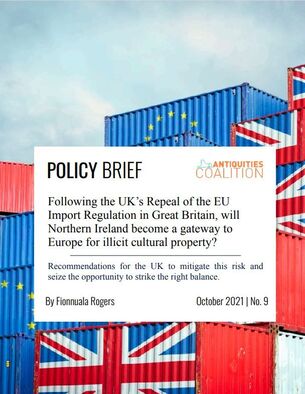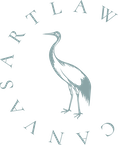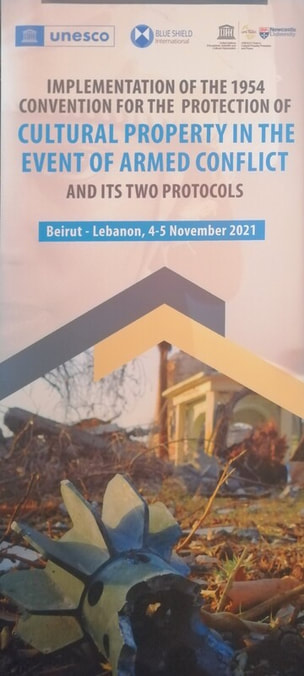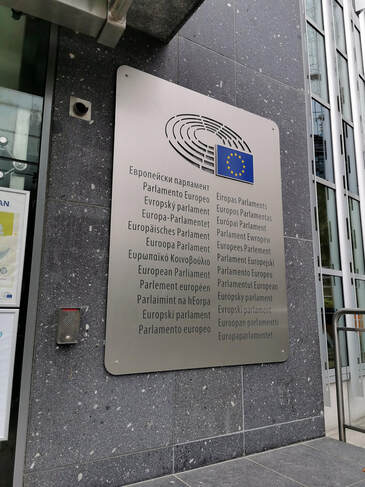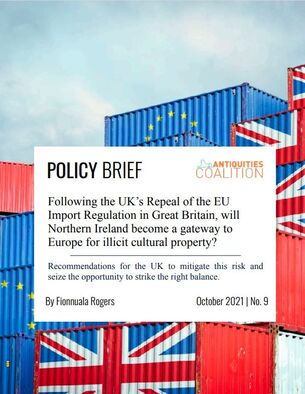|
16/11/2021 POLICY BRIEF: Think Tank Recommends British Government Close a Gateway for Illicit Cultural PropertyRead Now Chair of Blue Shield UK, Fionnuala Rogers, has worked with the major NGO Think Tank, The Antiquities Coalition, to release of a Policy Brief that analyses the UK’s decision to Repeal the EU Import Regulation in Great Britain and prevent the resulting risk of Northern Ireland becoming a gateway to Europe for illicit cultural property. Rogers argues that the repeal creates a gateway to Europe for illicit cultural property through Northern Ireland, where the regulation still applies, and that the UK must take immediate steps to mitigate that risk. This paper makes a series of recommendations to encourage the UK to rationalize its regulatory approach, meet its international commitments, and to set a leading example for other art market countries in cultural heritage protection.
The paper follows extensive lobbying by the UK Committee of the Blue Shield, including an earlier Press Release highlighting the issue and a Memorandum circulated to UK Government. The House of Lords cited UK Blue Shield and our Memorandum, and called the Government paper "misleading" when we challenged the Government's approach to N. Ireland in its repeal of EU Reg 2019/880 on the Introduction and Import of Cultural Goods (Hansard Debate).
Blue Shield UK was pleased to support a two-day training course on Implementing the 1954 Hague Convention and its two Protocols with the Lebanese Armed Forces (LAF) and the Directorate General of Antiquities (DGA). The course was organised by In collaboration with the UNESCO Regional Office–Beirut, and led by Blue Shield International.
The sessions involved lectures, group exercises, Question and Answer sessions, and discussions, enabling participants to increase their knowledge and understanding of International Humanitarian Law on cultural property protection, as well UN Conventions and other UNESCO legal instruments such as the 1970 Convention on the Means of Prohibiting the Illicit Import, Export and Transfer of Ownership of Cultural Property, the 1972 World Heritage Convention, UN Security Council Resolutions and how these impact on LAF’s mandate and operating procedures. Participants were encouraged not only to consider legal issues relating to CPP and efforts to prevent illicit trafficking, but also how threats and damage to both tangible and intangible CP are intrinsically linked to the protection of people and impact on their wellbeing. A number of sessions focused specifically on CPP in Lebanon and the importance of cooperation between LAF and the relevant Lebanese heritage institutions such as the Directorate General of Antiquities in times of conflict or natural and man-made disaster. It was a pleasure to enable and deepen collaboration and cooperation between LAF and the DGA throughout the Workshop. At the end of the training, those who took part were presented with certificates. Read more about Blue Shield work with the Lebanese Armed Forces
Read more about Blue Shield International’s work supporting DGA, UNIFIL and others in Lebanon following the Beirut Blast on 4 August 2020 Read more about the 1954 Hague Convention in our Law Library Visit the website of UNESCO Regional Office – Beirut PANEL: What is Cultural Property Protection?This year the Blue Shield is celebrating our 25th anniversary! The UK National Committee of the Blue Shield joined in the anniversary celebrations with the British Army Cultural Property Protection Unit with a free virtual panel discussion on 13 October to explore What is Cultural Property Protection? The last thirty years have seen a continual increase in cultural property protection, following the wars of Yugoslav succession in the 1990s, and the ensuing creation of the 1999 Second Protocol to the 1954 Hague Convention for the Protection of Cultural Property in the Event of Armed Conflict. A decade of conflict in the Middle East and North Africa has resulted in a new wave of ratifications for this important piece of legislation and its uptake into various civil and military agendas. Cultural property protection is now recognised as part of, or discussed in relation to, the laws of armed conflict, human security and the protection of civilians, peace and security, prevention of terrorist financing, international relations, and the responsibility to protect, amongst others. Yet, a recent Report by Blue Shield International and the Nordic Center for Cultural Heritage and Armed Conflict noted: “The concept of CPP is unclear and varies across organizations and expert communities. This confusion of ends, means and relevant authorities stands as a key barrier for setting priorities and allocating resources.” This panel asks what – in all these areas – does CPP mean, and what does it look like? What are the differences and what makes it unique? Are some aspects more relevant than others, and why? Is it one thing to all people, or has the field now advanced to the point where “cultural property protection” is no longer a catch all term, but one which must be defined in the contexts in which it is used? Join key leaders in cultural property protection to explore what it means to them in their work today. SPeakers
Read more about the Blue Shield 25th Anniversary on the Blue Shield International website
Read the Report by Blue Shield International and the Nordic Center for Cultural Heritage and Armed Conflict 24/5/2021 PRESS RELEASE: UK Blue Shield concerned UK unprepared to prevent UK becoming a gateway for looted objectsRead Now Blue Shield UK (BSUK) expresses concern that the UK government is unprepared to handle the challenges of maintaining distinct systems for the import of cultural goods into different parts of the UK and has significantly underestimated the risks this might pose to the increase of illicit trafficking through Northern Ireland. On 19th May 2021, the UK began to repeal the EU Regulation on the Import of Cultural Goods (EU 2019/880) (the “Regulation”) in Great Britain, but not Northern Ireland. The Regulation seeks to combat illicit trafficking, terrorist financing, and to protect cultural heritage. Despite agreeing with the objective, the UK Government is expected to pass the revocation quickly, as it considers it legally defective post-Brexit. The Regulation has been widely criticised for its potential effects on what many countries may recognise as legally owned objects which have no contribution to terrorist financing. However, its repeal in Great Britain but not Northern Ireland could create major challenges if the UK is not well prepared.
The Memorandum accompanying the revocation legislation suggests existing domestic laws are sufficient to prevent illicit trafficking but in reality, they are not actively enforced in the UK and do not require active checks of imported cultural goods. Furthermore, not all legislation applies equally across the UK [1], a fact which is notably absent from the Memorandum. As a result, by trying to reduce the requirements imposed by the Regulation, UK customs authorities will have to understand and operate three different sets of rules and laws to ensure no illicit cultural objects enter UK borders, depending on the point of entry. Professor Peter Stone, President of Blue Shield International, states: “The UK’s “do nothing” approach to the Regulation is a nod to the rest of the world that Great Britain is the destination for objects that do not meet the strict standards of the Regulation implemented across the EU, effectively reneging on its international commitments to tackle illicit trafficking. Culture is considered a key component of soft power and a significant part of the UK international agenda, so it is extremely disappointing that although the UK is required to enact measures to prevent illicit imports, it has chosen not to do so.” The EU adopted the Regulation in April 2019, with the aim of combatting trafficking, terrorism financing and to protect cultural heritage by preventing the import of cultural goods illicitly exported from their country of origin into the EU. Only part of the Regulation entered into force before the end of the Brexit transition period – Article 3(1), which prohibits the import of illegally exported cultural goods into the UK (and EU Member States), and which is considered retained EU law [2]. Alexander Herman, Assistant Director of the Institute of Art & Law, comments “The EU Regulation’s Article 3(1) prohibition on introducing cultural goods presents a significant expansion of the usual import restrictions for this sort of material. By repealing it, the UK may be seen to be facilitating the illicit trade, even if that is not its intention. Rather than a ‘quiet repeal’, the UK should instead come out and demonstrate its commitment to fighting illicit trade by ensuring that its existing national legislation is properly implemented and enforced at the border. Only through such actions will the UK be able to ensure that its art and antiquities market remains legitimate going forward.” The Regulation also sets out a licensing system, due to come into force in the EU in 2025, which the UK has always stated it would not adopt. However, the finalised Northern Ireland Protocol (Annex 2) (Dec 2020) declares Northern Ireland will adopt the full Regulation and the licensing system along with the EU. The Memorandum states that there will be “some impact on the movement of cultural goods into Northern Ireland” but gives no detail on how imports will be handled, nor the measures to prevent Northern Ireland being targeted as a gateway for cultural goods into the EU. Despite some acknowledgement of the impact, the Government maintains it will not change the way it imports cultural goods, relying instead on intelligence. However, this is extremely problematic: to adequately implement Article 3(1) (and ultimately the Regulation) in full, many changes will be required, and it is imperative that these measures are fully considered during the upcoming parliamentary debate. Cultural property lawyer and Chair of BSUK, Fionnuala Rogers, states: “It is highly likely that the EU will want to ensure that Northern Ireland does not become a gateway for cultural goods to enter the EU in violation of the Regulation. Equivalent checks will need to be carried out in Great Britain, and UK customs will need to ensure that cultural goods being exported to Northern Ireland, whether destined for the EU or not, have not been illegally exported from their country of origin, a check that is not currently required at UK borders. Ultimately, the UK is going to have to make some significant changes as a result of this Regulation, despite the revocation.” Once the EU licensing system is operational, UK authorities will need to issue licences on behalf of Northern Ireland and will almost certainly need some form of access to the EU database. Actively keeping the Regulation in Northern Ireland could also contribute to the offences the Regulation is designed to counter– potentially allowing goods with questionable legitimacy into the EU, effectively through a back door. The Revocation is the first step in what will become a significant separation between Great Britain’s approach to cultural goods and that of the EU and Northern Ireland. BSUK expresses its sincere concern that UK Government has not adequately considered how it will ensure adequate support, training, expertise and funding for Northern Ireland to comply with its obligations under the Regulation, or how it intends to harmonise the disjointed UK legislation in order to ensure the UK is will not become a gateway for illicitly trafficked objects. It is essential that the UK Government considers these matters during the parliamentary debate. Further, in recognition of UNESCO’s commitment to raise awareness of how to build an ethical art trade and in celebration of the 50th Anniversary of the Convention on the Means of Prohibiting and Preventing the Illicit Import, Export and Transfer of Ownership of Cultural Property 1970 (signed by the UK in 2001), BSUK also calls for a UK-wide working group to discuss how to mitigate the risks created by the inconsistent legal systems, and to support those tasked with implementing them. [1] The Dealing in Cultural Objects Offences Act 2003 does not extend to Scotland.
[2] For interpretation of “retained EU law” see section 6 of the EU (Withdrawal) Agreement Act 2018. 21/2/2021 LIVE PANEL: Following Brexit, will the UK become a centre of cultural racketeering?Read Now Will the UK become a gateway to Europe for illicit cultural property?On March 1, 2022 at 12:00 PM New York / 5:00 PM London, join the Antiquities Coalition for an engaging discussion with Think Tank Policy Brief author Fionnuala Rogers, Chair of UKBS, and an expert panel on the impact of the UK’s decision to repeal the EU Import Regulation in Great Britain, and recommendations for next steps. What was the UK’s reasoning behind the decision to repeal the regulation (and failure to replace it)?Will this repeal create a gateway to Europe for illicit cultural property through Northern Ireland, where the regulation still applies? And, how can the UK take advantage of this unique opportunity to adopt bespoke practices that fight cultural racketeering? Meet the speakersSophie V. Hayes Sophie Hayes has been a Detective Constable in the Metropolitan Police’s Art and Antiques Unit since 2016. She recently completed an MA in Cultural Heritage Studies at University College London. Alexander Herman Alexander Herman is Director of the Institute of Art and Law and co-directs the Art, Business and Law LLM developed with Queen Mary University of London. His new book ‘Restitution – The Return of Cultural Artefacts’ is out now. Tova Ossad Tova Ossad is the founder of Ossad Art Management, a bespoke registrar consultancy that is focused on the import and export of art in the United Kingdom, European and the United States as well as the application and administration of Temporary Admission accounts, British and European customs procedures, adjusting to the United Kingdom’s exit from the European Union, advice on storage solutions, and collections management. Fionnuala Rogers Founder and Director of Canvas Art Law and Chair of U.K. Committee of the Blue Shield, Ms. Rogers has been working in art law for 10 years, with a particular interest in cultural property and extensive experience in art and heritage in the Middle East, where she regularly works. She is the author of the AC Think Tank Policy Brief “Following the UK’s Repeal of the EU Import Regulation in Great Britain, will Northern Ireland become a gateway to Europe for illicit cultural property? Recommendations for the UK to mitigate this risk and seize the opportunity to strike the right balance.” Fionnuala Rogers worked with the major NGO Think Tank, The Antiquities Coalition, to release of a Policy Brief that analyses the UK’s decision to Repeal the EU Import Regulation in Great Britain and prevent the resulting risk of Northern Ireland becoming a gateway to Europe for illicit cultural property. Rogers argues that the repeal creates a gateway to Europe for illicit cultural property through Northern Ireland, where the regulation still applies, and that the UK must take immediate steps to mitigate that risk. read the briefThis paper makes a series of recommendations to encourage the UK to rationalize its regulatory approach, meet its international commitments, and to set a leading example for other art market countries in cultural heritage protection.
The paper follows extensive lobbying by the UK Committee of the Blue Shield, including an earlier Press Release highlighting the issue and a Memorandum circulated to UK Government. The House of Lords cited UK Blue Shield and our Memorandum, and called the Government paper “misleading” when we challenged the Government’s approach to N. Ireland in its repeal of EU Reg 2019/880 on the Introduction and Import of Cultural Goods (Hansard Debate).
UK Government are running a consultation on proposals to establish Freeports across the UK. Their proposal outlines the government’s proposals covering tax, customs, planning and encouraging innovation, and asks for views. Blue Shield United Kingdom has responded to the consultation to expresses concerns that the current proposal is not robust enough to prevent the illicit trafficking of cultural property. executive summaryThere are demonstrable links between Freeports and illicit trafficking of cultural property (CP) with many countries increasing Freeport regulation. The UK Government has committed to CP protection and the prevention of illicit trafficking of CP; internationally, the opening of Freeports in the UK may be perceived as contradictory to those commitments. In particular, if the UK departs from the EU’s more stringent measures to combat illicit trafficking of CP, the UK could be seen as a “haven” in which to store illicit CP if UK Freeports have significantly lower requirements. (EU measures include new EU Cultural Property Import Regulations 2019 which create an electronic import licensing system for CP coming into the EU, require export licences for at risk CP, and import declarations otherwise). As the UK’s Freeport proposals go against the trend of other countries, the UK must ensure it can demonstrate robust measures are in place to prevent illicit trafficking of CP (including that below the £10,000 threshold, which is still a significant contributor to organised crime) and that it has learned from the mistakes of other Freeports around the world.
In this Evidence and Annexes, we aim to:
Read more about the Consultation on the UK Government website
Read the Response to the Consultation on the UK Government Website Respect and Protect: Fulfilling The Obligation To Safeguard Cultural Property In The Military ContextTalks are now available online from this one day Society of Antiquaries / Historic England conference, organised with support from the UK Blue Shield Committee and Newcastle University. about the eventAwareness of the harm that armed conflict does to the world’s cultural heritage has probably never been higher. Events in the former Yugoslavia, Iraq and Syria are fresh – raw, even – in the communal consciousness. The issues, though pressing, are not necessarily simple, and 2019 sees a range of events, exhibitions and conferences on the general themes, in Britain and abroad. Both nationally and internationally there is a sense of being at a critical point in understanding what is at risk, and in formulating a practical response. On the military side, the framework for that practical response is the Law of Armed Combat and the Hague Convention of 1954. With the long-awaited ratification of the Convention in 2017 the UK became obliged to create a military capability to identify and safeguard cultural property in areas of armed conflict. But both in the British armed forces and in NATO measures were already well under way to deliver this capability and ensure that the Convention’s requirement to ‘respect and protect’ cultural property in conflict zones is written into operational decision-making processes.
Speakers
Aimed at the archaeological, wider academic and interested lay communities, this day conference was a chance to hear from those directly involved in this field and discuss the issues and challenges faced. Speakers included Prof Peter Stone OBE FSA, UNESCO Chair in Cultural Property Protection and Peace at Newcastle University and Chair of UK Blue Shield; Lt-Col Tim Purbrick OBE FSA, the newly appointed commander of the British Army’s Cultural Property Protection Unit; Dr Paul Fox FSA, member of the UK Blue Shield Committee; and other experts and scholars. Speakers included:
Blue Shield United Kingdom [1] notes with grave concern the recent statements by the President of the United States of America that he is contemplating targeting cultural sites in Iran if Iran reacts to the killing of General Qasem Soleimani, and possible support for his actions from the UK Government. We support the legal analysis of Blue Shield International: the intentional targeting of cultural and religious sites (that are not legitimate military objectives and have no imperative military necessity), is prohibited specifically, under any circumstances, in international humanitarian law, most notably in the 1954 Hague Convention on the Protection of Cultural Property in the Event of Armed Conflict and its Second, 1999, Protocol [2]. Cultural property protection is also an integral part of the 1977 Additional Protocol I to the 1949 Geneva Conventions (arts 53 and 85(4)(d)); the 1998 Rome Statute of the International Criminal Court (arts 8(2)(b)(ix) and 8(2)(e)(iv)); and United Nations Security Council Resolution 2347. The protection of cultural property in the event of armed conflict is regarded as Customary International Law. The USA was the first country to enshrine the protection of cultural property in the event of armed conflict in the 1863 Lieber Code [3] during the American Civil War. More recently, individuals were found guilty and imprisoned for deliberate crimes against cultural property under the remit of the International Criminal Tribunal for the Former Yugoslavia; and, in 2016, Mr Al Mahdi, a member of the extremist group Ansar Dine, was sentenced to nine years imprisonment and given a €2.7 million fine by the International Criminal Court under the Rome Statute, for the destruction of nine mausolea and a mosque in Timbuktu, Mali. It would be a major undermining of international humanitarian law, and a significant set-back for the international community, if the USA and the UK had to be added to those responsible for the deliberate, calculated, illegal destruction of cultural heritage. We ask Her Majesty’s Government to immediately raise the issue of illegitimate targeting of cultural sites with the White House, and to encourage them to remove all cultural sites from the list to be targeted. Targeting such sites will be regarded as a war crime. We further ask HMG to confirm to Parliament and the country that no UK personnel or assets will be used to support action that would be seen as a war crime. For further information please contact: Professor Peter G Stone, Chair, Blue Shield United Kingdom – [email protected] [1] Blue Shield United Kingdom is the UK Branch of the Blue Shield. Our mission is to protect the world’s cultural property- cultural and natural, tangible and intangible – in the event of armed conflict, natural- or human-made disaster. [2] 1954 Hague Convention ratified by the USA in 2009, and the UK ratified the Convention and both Protocols in 2017. Geneva Convention Additional Protocols I and II 1977 ratified by the UK in 1998; Rome Statute ratified by the UK in 2001. [3] The ‘Lieber Code’, officially General Order 100, Instructions for the Government of Armies of the United States in the Field see https://uscbs.org/1863-lieber-code.html UKBS was privileged to support the UK Reserves Cultural Property Protection Unit (CPPU) in running the UK’s first CPP Special to Arm course at the Defence School of Policing and Guarding at Southwick Park. The course trained the students to deliver CPP as part of higher-level military planning processes. It also covered the law, the history of the UK’s Second World War antecedent units and introduced specialist areas including illicit cultural property trafficking, war crimes, resilience, Defence Engagement, Humanitarian Assistance and Disaster Relief, use of drones for assessment, first aid for damaged cultural property and philosophical issues. The UK Reserves CPPU officers were joined by officers from Austria, Australia, France, Italy, Netherlands, US, UNESCO, Interpol, Carabinieri Unit for the Protection of Cultural Heritage, Metropolitan Police, NATO, DfID, DCMS and 1 MP Brigade. Dr Paul Fox from the UK Blue Shield designed and directed the delivery of the course, supported by other members of UK Blue Shield. Professor Peter Stone, Dr Emma Cunliffe, and Valentina Sabucco played locals with information, in varying forms of distress, to highlight the critical reality that cultural heritage protection is all about people. Prof Lisa Mol from UCL provided advice on damage caused to stones by munitions, and demonstrated the support that civilian subject matter experts can provide to CPP officers, and the importance of close collaboration. Prof Nigel Pollard from Swansea University, also a member of UK Blue Shield, delivered a presentation on the history of the Monuments Fine Arts and Archives Branch and the Art Looting Investigation Unit during the Second World War. The students conducted reconnaissance trips to the National Trust’s Hinton Ampner House and English Heritage’s Fort Brockhurst and to the Royal Garrison Church in Portsmouth, to learn about evacuation of cultural property, cultural property refuges, and damage assessment of CP in conflict. UK Blue Shield would like to thank the British Army, and in particular Lt. Col. Tim Purbrick, for the chance to participate in this highly valuable exercise. His exceptional dedication and hard work have made the creation of a CPP Unit in the UK possible. UK Blue Shield is committed in continuing working in close partnership with the Unit to deliver further training and provide support. Over the next month CPPU officers will be working with NATO, the Carabinieri, Historic Royal Palaces and the Defence Academy, and – together with Blue Shield International – with the Irish Defence Forces. 13/6/2018 UK Blue Shield Position Paper on UK Adoption of the EU Regulation on the Import of Cultural GoodsRead Now On 13 July 2017, the European Commission proposed new rules to stop imports in the European Union of cultural goods illicitly exported from their country of origin – the EU Regulation on the Import of Cultural Goods. A vote is scheduled on the 10 July 2018, and – if successful – the new regulations are expected to apply across all EU Member States from 01 January 2019. UK Blue Shield recognises that the Proposed Regulations have an important and necessary objective: to prevent the import and storage in the EU of cultural goods illicitly exported from a third country, thereby reducing trafficking in cultural goods, combatting terrorism financing and protecting cultural heritage, especially archaeological objects in source countries affected by armed conflict. However, we have a number of concerns, which we express in this position paper
There are three major flaws: the inadequacy of using the 1970 UNESCO Convention; the difficulties in establishing a source country; and the difficulty identifying items in the different Categories of cultural goods. We also express a number of additional concerns which we do not consider to be fundamental but should be considered. If not addressed, we are concerned that the proposed Regulations may be insufficient to achieve their intended goals. UKBS urges the UK Government address the concerns posed here in order to work towards comprehensive, pragmatic legislation. UKBS has also released two other papers concerning UK implementation of the 1954 Hague Convention for the Protection of Cultural Property in the Event of Armed Conflict (ratified December 2017), and the s.17 Offence.
In April 2018, UK Blue Shield released its second Position Paper on the Implementation Guidance for the 1954 Hague Convention for the Protection of Cultural Property in the Event of Armed Conflict and both Protocols (HC54), created by the UK Government. The second paper specifically focuses on the new s.17 offence created in the legislation – Dealing in unlawfully exported cultural property.
In December 2017, the 1954 Hague Convention for the Protection of Cultural Property in the Event of Armed Conflict and its First and Second Protocols (1954/1999) (hereafter the “Convention”, “First Protocol”, and “Second Protocol” respectively”) entered into force in the UK, together with the Cultural Property (Armed Conflict) Act 2017 (“CPAC Act”). The CPAC Act includes a criminal offence pursuant to Article 15 of the First Protocol which creates the offence of Dealing in Unlawfully Exported Cultural Property. (“s.17 Offence”). In November 2017 the Department of Culture Media and Sport released Guidance for art dealers and those in the art market in respect of the CPAC Act, and specific guidance in respect of the s.17 Offence (“s.17 Guidance”). UK Blue Shield welcomes the implementation of the Convention and its Protocols as an important step in the UK’s fight to protect cultural heritage during armed conflict. We also welcome the UK’s implementation of a right to seize unlawfully exported cultural property, as set out in s.19 of the CPAC Act, which we hope may contribute to the repatriation of cultural property to territories that have suffered the loss of their cultural heritage as a result of conflict. However, as the s.17 Guidance is addressed largely to those in the art market, which typically includes collectors, art dealers, auction houses and shipping agents, the majority of whom do not have a legal background, we are concerned that the s.17 Guidance lacks necessary detail and clarity in some fundamental areas which are vital to the spirit of the Convention and its Protocols. As a conviction under s.17 of the CPAC Act may attract a custodial sentence of up to 7 years, we urge the UK Government to address the concerns set out herein to provide greater clarity to those involved in the art market as to their obligations and to highlight how these obligations have changed as a result of the introduction of the s.17 Offence. We hope that the s.17 Offence acts as a deterrent and encourages all those involved in the art market to exercise due diligence when dealing in cultural property, thus ensuring that the UK fulfils its obligations under the Convention to respect cultural heritage and to combat the illicit trafficking of cultural property unlawfully exported during conflict. Read our first position paper – Implementation Guidance for the 1954 Hague Convention for the Protection of Cultural Property in the Event of Armed Conflict and both Protocols (HC54): Position Paper.
Following the recent ratification of the 1954 Hague Convention, and both Protocols, the UK Government released Implementation Guidance for the 1954 Hague Convention for the Protection of Cultural Property in the Event of Armed Conflict and both Protocols (HC54). In February 2018, UK Blue Shield released its first Position Paper on these Guidelines, suggesting a number of areas for improvement.
UK Blue Shield welcomes the ratification of this important convention, which will provide internationally mandated standards to aid our armed forces safeguard cultural property on operations and to protect cultural property in the face of future threats to the UK. However, we express our concern that the implementation of the Cultural Property (Armed Conflicts) Act may fall short of its intended purpose, placing UK cultural property at risk. This outcome would be unfortunate, given the UK’s role scrutinising armed conflicts as a Permanent Member of the UN Security Council, potentially compromising the UK’s ability to lead by both action and example in this field. HC54 is the only international treaty specifically to deal with the protection of cultural property in armed conflict. It is the only convention to set out for the defence, security, and heritage sectors the steps to be taken in peacetime, as well as during armed conflict, in order that all three sectors may take the necessary precautions, in accordance with the Laws of Armed Conflict, to protect cultural property. We urge the UK Government to seize the opportunity offered by ratification and address the concerns posed here in order to work towards the comprehensive, pragmatic implementation of this legislation.
On 12 September 2017, the United Kingdom of Great Britain and Northern Ireland deposited with the Director-General of UNESCO its instruments of ratification of the Convention for the Protection of Cultural Property in the Event of Armed Conflict and of accession to its First and Second Protocols (accompanied by a Declaration on the UNESCO website). In December 2017, the Cultural Property (Armed Conflicts) Act entered into force in the UK, and both are now part of the domestic legislation of the United Kingdom. Professor Peter Stone, Chair of UK Blue Shield said: This is absolutely wonderful news and to be honest it hasn’t completely sunk in yet,” said Professor Stone. “We’ve been working towards this since 2003 and for the UK to have finally ratified the Convention and both its Protocols is long overdue. I thank the UK National Commission for UNESCO for its early support for this to happen and all of those in both Houses of Parliament who have pushed for this over the last few years and who have guided the necessary internal legislation through so efficiently. Ratification is accompanied by Implementation measures, which were released in a statement by John Glen, The Minister for the Arts, Heritage and Tourism.
At 11.06am on Thursday 23 February the Cultural Property (Armed Conflicts) Act received Royal Assent. The UK is now set to become the first permanent member of the UN Security Council to ratify the 1954 Hague Convention for the Protection of Cultural Property and BOTH it’s Protocols, a move we hope other countries will follow.
This reflects years of hard work by UK Blue Shield. The process for formal ratification of the 1954 Hague Convention and accession to the Protocols:
(Text taken from a lovely summary by the Heritage Alliance) The UK National Committee of the Blue Shield is very pleased to welcome the announcement made in the Queen’s Speech on 18th May 2016 that HM Government intends to table legislation which will result in the UK being able to accede to the 1954 Hague Convention of the Protection of Cultural Property in the Event of Armed Conflict and its two Protocols of 1954 and 1999. The 1954 Hague Convention is the primary piece of International Humanitarian Law concerning the protection of cultural property during armed conflict. It was first adopted by countries following the massive destruction of cultural property during the Second World War and, since then, has provided a framework for the protection of cultural property from the effects of international and domestic armed conflict. Parties to the 1954 Hague Convention are required to respect cultural property situated within the territory of other Parties by not attacking it, and to respect cultural property within their own territory by not using it for purposes which will expose it to damage or ruin during armed conflict. The Chair of the UK National Committee of the Blue Shield, Professor Peter Stone OBE, said of the announcement: This is really excellent news – something we have been waiting for since 2003. By committing to ratify with a clear timetable the UK is finally on the verge of joining the international community in recognising the value and importance of cultural property to local, national, and international communities and their identities. In echoing Professor Stone’s words, Karl Habsburg, the President of Blue Shield International, added that it was “A great day for the international community concerned with the protection of cultural property during conflict and as the result of natural disaster. In 2003, when Coalition forces invaded Iraq, neither the USA nor the UK had ratified the 1954 Hague Convention or its Protocols of 1954 or 1999. Subsequently, in 2009, the USA ratified the Convention, but not the Protocols. The UK is now arguably the most significant military power (and the only one with extensive military involvements abroad) not to have ratified the Convention. The MoD currently works “within the spirit of the Convention”. Despite constant public commitments to ratify the 1954 Hague Convention and both its Protocols, since 2003 successive UK governments have hitherto failed to find Parliamentary time to pass the necessary internal legislation to allow ratification. On hearing of the announcement, Baroness Andrews OBE, who led the January debate in the House of Lords on ratification, stated: I’m really delighted that the Government has finally committed to the ratification of The Hague Convention and its Protocols.” It’s been far too long in the coming and there was a lot of frustration in the recent House of Lords debate that we were almost alone in our failure to ratify. I look forward to working closely with the UK Armed Forces and others to ensure that whenever and wherever the UK deploys its personnel overseas that they are fully prepared to ensure cultural property can be protected commented Professor Stone.
The tabled Bill announced in the Queen’s Speech provides not only for the ratification of the 1954 Hague Convention and its two Protocols of 1954 and 1999; amongst other measures, it will finally criminalise the dealing of cultural property illegally exported from an occupied territory, and ensure that any and all cultural property protected under the Convention is identifiable by the distinctive Blue Shield emblem. It follows another announcement made in 2015 in which the UK Government established a Cultural Property Protection Fund. |
Details
Categories
All
Archives
November 2021
|
|||||||||||||||||||||||||||||||||||||||||||||||||||||||||||
